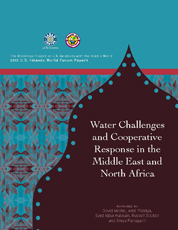On May 29-31, 2012, the Stimson Center convened a workshop on Water Challenges and Cooperative Response in the Middle East and North Africa as a component of the 2012 US-Islamic World Forum held in Doha, Qatar. Participants included scientists, academics, policy analysts, and practitioners from several MENA countries, as well as US and European experts. The interdisciplinary working group identified the principal water resource issues facing decision makers and stakeholders in the region, assessed the MENA states’ existing governance capacities and resources to address these emerging pressures, and recommended priority areas and approaches for advancing international and intersectoral cooperation and for identifying and strengthening intellectual and technical resources, tools, lessons, and best practices that could be shared, applied, or adapted across the region.
This report first provides a brief overview of available water resources in the MENA region. It then discusses the salient socio-economic and environmental stresses and trends that will drive and condition water supply and demand over the coming decades. Next, the report sketches prevailing water management approaches that are being developed or might be brought to bear. With this foundation in place, the report then seeks to illuminate the water governance policy options and obstacles confronting the region by examining three case studies: the Tigris-Euphrates basin, the Nile basin, and a side-by-side consideration of water stewardship in Yemen and Oman. Finally, the report concludes by presenting some recommendations suggesting strategies for the MENA countries to build their water management capabilities and bolster collaborative alternatives to managing scarce water resources at both the domestic and regional levels.
Read more about the 2012 U.S.-Islamic World Forum publications »
The Brookings Institution is committed to quality, independence, and impact.
We are supported by a diverse array of funders. In line with our values and policies, each Brookings publication represents the sole views of its author(s).




